“A budget doesn’t limit your freedom; it gives you freedom.”
It’s no secret budgets are an essential tool for business (success). Historically budgets are set towards the end of your financial year ready for the next year. They are an important indicator of your business’s health, however over the last three years setting annual budgets has presented some challenges due to several economic factors including a global pandemic, increased inflation, and challenges with global supply chains.
Before you start looking at your next budget or do a detailed review of your current one, keep these five tips in mind.

One. What have you spent in the past?
- You should look at your historical costs across every aspect of your business, this will include:
- Reviewing any one-off costs for your business such as subscriptions.
- Looking at occupancy costs for your rent – do you have a current tenancy agreement – do you expect any increases?
- Consider your ‘people’– are you recruiting? Will you be promoting anyone? What oncosts will flow from these changes?
- Costs of materials – have a conversation with your suppliers – can you renegotiate terms and or are they forecasting an increase? Are there more favourable terms available when looking at increasing the quantum of your purchases.

Two. Fixed costs
- Once you review what you have spent in the previous year, it’s important you know the fixed costs for your business. This will include items like insurance, rent and management costs.
- For example, if you are in the construction industry you should consider your fixed costs when quoting a job, not just the variable costs.
- You should also understand what the market will allow you to charge – it would be timely to undertake a competitor pricing analysis, so you understand where you stand in the market.
- It may also be timely to review any fixed price sales strategies you employ.

Three. Seasonality
- Some businesses do well during certain times of the year so it’s important to review your working capital during seasonal fluctuations to ensure you have sufficient cash flow to complete the work before you are paid – it’s all about staying ahead of the curve.
- It’s also critical to stay on top of your debtors. As soon as a debtor is late you should have a mechanism in place to follow up at an appropriate time – keeping in mind the fine balance between getting paid and nurturing your ongoing relationship.

Four. Contingency
- When setting a business budget, it’s also best practice to add a contingency for costs that may not be known – as a rule, we suggest adding 10%.
- Think about this … if you are renovating a property, the rule of thumb is to add a contingency to your budget. This will hopefully cover items that may arise during the build – either a (nasty) surprise once you start to dig or a change in the scope of works.

Five. Put in place a timetable for reviewing your budget
- Budgets should not be set and forgotten.
- With economic unrest continuing, it’s important your financial KPI’s are reviewed on a regular basis. For some businesses this is monthly, for others is quarterly – choose a timetable that suits your business. The main facets to review are your cashflow, profit & loss, balance sheet and debtors / creditors.
We follow these tips (and more) for our outsourced CFO (OCFO) clients. We work with hundreds of OCFO clients across many diverse industries, allowing us to create a best practice methodology – one that we continually review as the world continues to change around us.
At ESV our team helps our clients to look forward, so they can manage any situation before it becomes a ‘fire’. It’s knowing (and telling) the story behind the numbers as we help our clients on their journey for growth.
If you don’t have a plan for your next budget review, please reach out. Similarly, if you have worked on your next budget but are looking for an expert to review your numbers and put proactive strategies in place, please reach out. We work collaboratively with our clients so they can manage any curve balls before they impact their bottom line.





